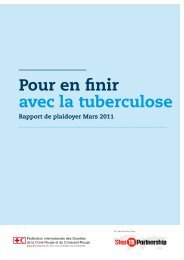Thailand - Stop TB Partnership
Thailand - Stop TB Partnership
Thailand - Stop TB Partnership
You also want an ePaper? Increase the reach of your titles
YUMPU automatically turns print PDFs into web optimized ePapers that Google loves.
Distribution<br />
In addition to manufacturing drugs, the GPO also oversees drug distribution. The Regional<br />
Office of Disease Prevention and Control directly distributes <strong>TB</strong> drugs to 19 zonal <strong>TB</strong> control<br />
centers, which in turn supply the provincial and district hospitals. District health workers<br />
then collect <strong>TB</strong> drugs from district hospitals, and supervise distribution by local health<br />
workers to patients.<br />
A case study in southern <strong>Thailand</strong> revealed drug shortages and overstocking at<br />
the local level, beyond the provincial and district hospitals’ control. According to the study,<br />
rifampicin was overstocked most frequently (five times the recommended amount) and<br />
shortages of ethambutol were most common. 137 Local solutions to these problems include<br />
extra purchasing, requesting additional drug supplies to cover shortages, and sending surplus<br />
drugs to other institutes. In 1999, approximately 555,000 baht ($14,681) worth of <strong>TB</strong><br />
drugs expired due to overstocking. 138 A more centralized system of drug management and<br />
distribution would help eliminate or decrease such inefficiencies.<br />
Education and research<br />
The MoPH has supported a range of operational research projects on issues related to <strong>TB</strong><br />
control. Thai <strong>TB</strong> experts emphasize the importance of prioritizing research that can be<br />
translated into policy, and of relating research priorities to the most pressing issues in the<br />
field, such as <strong>TB</strong>/HIV, the impact of health reforms on <strong>TB</strong> control, and the existence of<br />
subepidemics and inadequate access to services among vulnerable groups.<br />
To date, the NTP has prioritized operational research on DOTS, with a focus on<br />
evaluating DOTS implementation, the behavioral factors associated with adherence to <strong>TB</strong><br />
treatment, and the cost effectiveness of the <strong>TB</strong> control strategy. In addition, funding agencies<br />
such as the <strong>Thailand</strong> Research Fund and the Health System Research Institute have<br />
hosted meetings to brainstorm on <strong>TB</strong> research priorities. Regional and district-level research<br />
has reflected regional priorities such as <strong>TB</strong>/HIV (in the northern region) and the impact of<br />
decentralization on <strong>TB</strong> control activities (in Yala province, southern <strong>Thailand</strong>).<br />
The government should commit financial resources to conduct research on the<br />
following:<br />
• further standardization of <strong>TB</strong> diagnostic and treatment services to minimize the<br />
risk of MDR-<strong>TB</strong><br />
• the effects of sociocultural factors on <strong>TB</strong> adherence<br />
• techniques for diagnosing <strong>TB</strong> among HIV patients<br />
• the effect of health system reform on NTP implementation<br />
60<br />
<strong>TB</strong> POLICY IN THAILAND



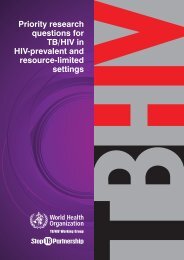
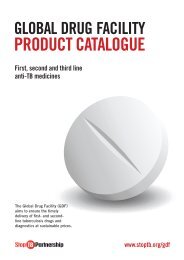
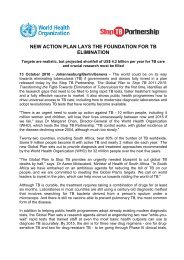
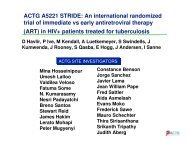
![Global Drug Facility Annual Report 2011 [.pdf] - Stop TB Partnership](https://img.yumpu.com/26788745/1/184x260/global-drug-facility-annual-report-2011-pdf-stop-tb-partnership.jpg?quality=85)

![Concept note on national stop TB partnership [.pdf]](https://img.yumpu.com/26788741/1/184x260/concept-note-on-national-stop-tb-partnership-pdf.jpg?quality=85)

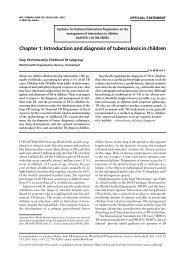
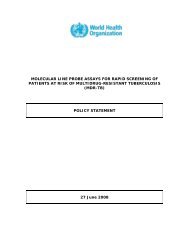
![2005 and Challenges for 2006 - 2015 [.pdf] - Stop TB Partnership](https://img.yumpu.com/26788674/1/190x245/2005-and-challenges-for-2006-2015-pdf-stop-tb-partnership.jpg?quality=85)
![Brochure (French) [.pdf] - Stop TB Partnership](https://img.yumpu.com/17234792/1/190x91/brochure-french-pdf-stop-tb-partnership.jpg?quality=85)

